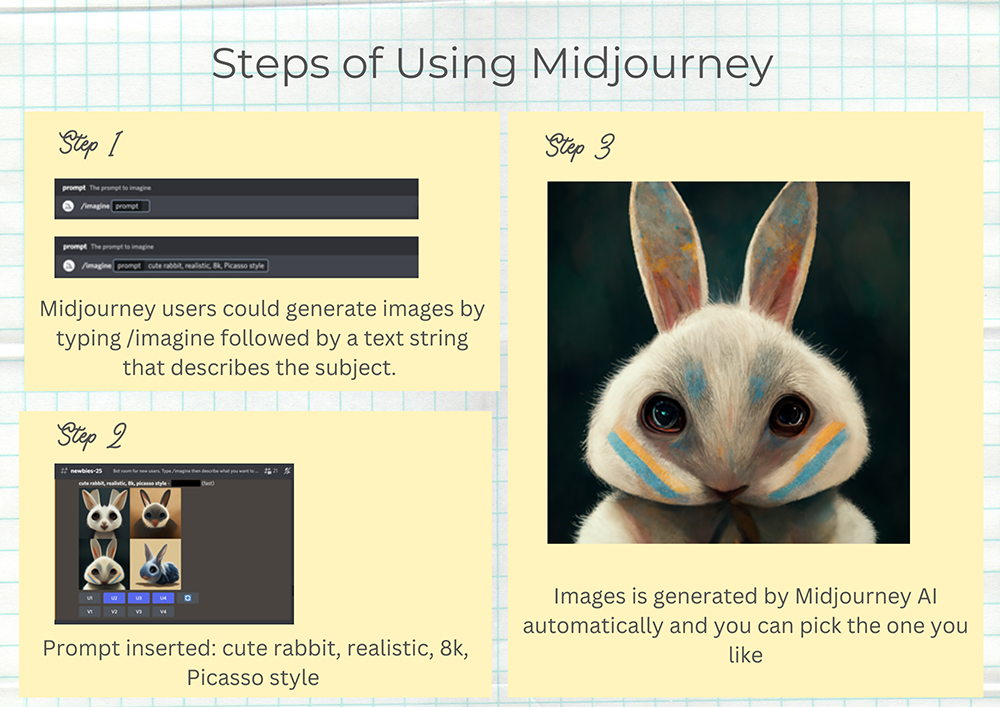AI-powered drawing programs become double-edged swords to artists’ careers.
By Karmen Yip
Creating art is no longer a lengthy and tedious process that even professional artists and illustrators are mesmerized by stunning images generated by artificial intelligence.
“AI-powered programmes are additive tools for people who might not know how to deal with proportions but have the eye and the heart to produce art,” digital and computational artist Hassan Ragab says.
Used traditional drawing methods for a long time, the Los Angeles-based designer has been using Midjourney, one of the AI-powered tools to create a wide range of artwork since July 2022.
Any Midjourney user can create images on command. Simply typing a few words into a text box, the AI tool will return four newly created images within 60 seconds. Users can also request AI to improve, or “upscale”, the visual quality with new variations.

The startup Midjourney AI describes itself as “an independent lab that expands the imaginative capabilities of humankind”. It operates on the chat platform Discord, which has 3.6 million users.
Besides Midjourney, DALL-E, NightCafe, and Deep Dream Generator are other popular AI-powered programmes that allow users to generate AI art.
Ragab, an interdisciplinary designer with an architectural background living in Southern California, points out that artists and even people who know little about drawing skills can boost their creativity extensively with Midjourney and other AI image generators.
“AI is a democratic and powerful tool. Everybody can use it and using the tool does not require any advanced computational skills,” he says.
The Egyptian artist adds that these AI programmes are powerful for artists to explore and expand their imagination.
“AI-powered tools sometimes match your prompts unpredictably and within that, you try to explore another angle which is very hard to see as an artist. Human artists like me will have to spend months brainstorming mind-blowing ideas,” he says.
“But with these tools, I can go around my design from different angles in a few hours. That pushes your idea in ways that could have never happened before,” he further explains.
Praising AI tools are empowering imagination, Ragab noted some artists already fear their jobs will be replaced.
“That being said, I think a lot of the artists who do not keep up with the technology might be signing their own career death letters. You should know about current technology trends and keep up with them,” he adds.
“But with these tools, I can go around my design from different angles in a few hours. That pushes your idea in ways that could have never happened before.”
AI Winning Against Artists?
While Ragab feels excited about using Midjourney to create the artworks he likes, some artists think otherwise.
Artists were enraged after game designer Jason M. Allen won first place at the 2022 Colorado State Fair annual art competition with “Théâtre D’opéra Spatial”, an artwork generated by the Midjourney AI programme.
Sapphire Yuen Hiu-wan, who is now chasing her animation dream in Los Angeles, thinks it is unfair to other artists in the competition because someone with no art background and uses an AI programme to create artwork wins.
“The AI programme absorbs a lot of original content from the internet and previous artworks, then it redesigns according to the user’s needs. So these images are not 100 per cent original,” she explains.
“Nobody has ever used an AI-generated image to compete in that art competition. We do not even know if the game designer has credited the original artists that inspired the image,” says the freshman at Santa Monica College in the United States.
AI algorithms are advancing so fast that the Hongkonger is worried about her future career but believes it does not affect her as a creator for now.
“AI technology is growing extensively in different industries and you really need to keep up with it. It is a new challenge every creative person is facing,” she says.
The aspiring animator says AI programme users are buying themselves a ticket to the competitive arts industry and more people will generate AI-powered artworks with these programmes.
“AI technology is growing extensively in different industries and you really need to keep up with it. It is a new challenge every creative person is facing.”
AI Is Not Flawless
Although AI-based tools can help people create amazing artwork with ease, Chau Chuck-jee, a lecturer in the Department of Computer Science and Engineering at the Chinese University of Hong Kong says they cannot completely replace humans.
He notes AI merely extracts different characteristics from original data and then combines them into new ways to give an impression of reminiscence to the users.
“The computer simply tries to mimic and most likely does not have a mind of creativity, so this is a drawback if the user wants some creative value coming up from the algorithm,” he explains.
The expert in computer algorithms states that another problem of AI-generated artwork is data bias, an error that occurs because of the use of unrepresentative training data.

“Most AI systems make decisions based on their training data that has been shown to them. If the data were not comprehensive enough for reasonable coverage, wrong decisions could be made by the AI. This is the problem of data bias,” he says.
“For example, if an AI system was trained only using data from Van Gogh’s paintings, it may be able to judge well the quality of paintings of similar style and it might generate artworks in similar style too. But the system would not be expected to generate, for example, Picasso-style art, using the current training set,” he explains.
Edited by Felicia Lam
Sub-edited by Ella Lang







































